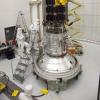Science & Technology
 <p>NASA Administrator Charles Bolden will give a free public talk at the University of Colorado Boulder April 18 on America’s space program and the challenges and opportunities the space agency will encounter as it moves through the 21st century.</p>
<p>NASA Administrator Charles Bolden will give a free public talk at the University of Colorado Boulder April 18 on America’s space program and the challenges and opportunities the space agency will encounter as it moves through the 21st century.</p>
<p>The talk, titled “NASA’s Roadmap to Tomorrow’s Missions,” will be held at CU-Boulder’s East Stadium Club on the east side of Folsom Field from 2:45 to 3:30 p.m. The presentation will be followed by a question-and-answer session with the audience.</p> <p>On most nights, <a href="http://tomyeh.info/about.html" target="_blank">Tom Yeh</a> puts his 3-year-old son on his lap, opens a children's book and reads aloud. It's a much-loved activity for both father and son as the characters are brought to life.</p>
<p>On most nights, <a href="http://tomyeh.info/about.html" target="_blank">Tom Yeh</a> puts his 3-year-old son on his lap, opens a children's book and reads aloud. It's a much-loved activity for both father and son as the characters are brought to life.</p>
<p>A year ago, while reading the children's classic <em>Goodnight Moon</em>, Yeh, an assistant professor in computer science, began thinking about how to make books more accessible to visually impaired preschool-age children.</p>- <p>The University of Colorado Boulder today announced the hiring of Timothy Orr as producing artistic director of the Colorado Shakespeare Festival.</p>
<p>Orr has been serving as interim director since February 2013 and was hired at the conclusion of a nationwide search for a permanent director.</p>
<p>Orr has been with the Colorado Shakespeare Festival as a performer since 2007 and joined the staff as the associate producing director in 2011. </p> - <p>A record number of University of Colorado Boulder students have received a prestigious National Science Foundation Graduate Research Fellowship, which recognizes outstanding graduate students in the science, technology, engineering and mathematics (STEM) fields.</p>
- <p>Members of the business community are invited to attend AeroSpace Ventures Day on April 17 at the University of Colorado Boulder.</p>
<p>The all-day event offers aerospace industry technologists, scientists and managers a chance to connect with 24 CU-Boulder faculty members and to learn about technological and scientific advances with applications ranging from human space exploration to climate and weather. Corporate recruiters and hiring managers also are invited to meet with the 140 undergraduate and graduate engineering students who have registered for the event.</p> - <p>Tremendous growth in enrollments and a changing economic, technological and reputational landscape have prompted the College of Engineering and Applied Science at the University of Colorado Boulder to set two ambitious new goals for the year 2020. Improvements in the college’s “Best Graduate Schools” rankings, released in mid-March by U.S. News & World Report, indicate good progress in the right direction.</p>
 <p>A NASA spacecraft studying the moon’s atmosphere and dust environment, which is carrying a $6 million University of Colorado Boulder instrument, is slated to crash into the lunar surface April 21 following a successful 130-day mission.</p>
<p>A NASA spacecraft studying the moon’s atmosphere and dust environment, which is carrying a $6 million University of Colorado Boulder instrument, is slated to crash into the lunar surface April 21 following a successful 130-day mission.</p> <p>A free, downloadable guide for individuals who want to collect baseline data on their well water quality and monitor their groundwater quantity over time was released this week by the University of Colorado Boulder’s Colorado Water and Energy Research Center (CWERC).</p>
<p>A free, downloadable guide for individuals who want to collect baseline data on their well water quality and monitor their groundwater quantity over time was released this week by the University of Colorado Boulder’s Colorado Water and Energy Research Center (CWERC).</p>- <p>Three University of Colorado Boulder undergraduates have been awarded prestigious Goldwater Scholarships for 2014.</p>
<p>The scholarships, which are worth up to $7,500 each, are awarded annually to sophomores and juniors across the nation on the basis of high academic merit. The 2014 winners from CU-Boulder are Jasmine Brewer, a junior in engineering physics, Brennan Coffey, a junior in chemical engineering and applied mathematics, and Ryan Dewey, a junior in astrophysics and physics.</p>  <p>Kathleen Sebelius, secretary of the U.S. Department of Health and Human Services, will deliver the keynote address at the University of Colorado Boulder’s annual Conference on World Affairs to be held April 7-11.</p>
<p>Kathleen Sebelius, secretary of the U.S. Department of Health and Human Services, will deliver the keynote address at the University of Colorado Boulder’s annual Conference on World Affairs to be held April 7-11.</p>
<p>Sebelius’ address, “The Globalization of Health,” will be presented on Monday, April 7, at 11:30 a.m. in Macky Auditorium. All of the conference’s 200 panel discussions, performances and plenaries are free and open to the public.</p>


